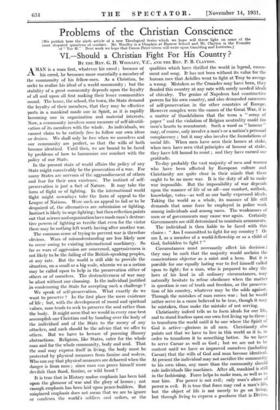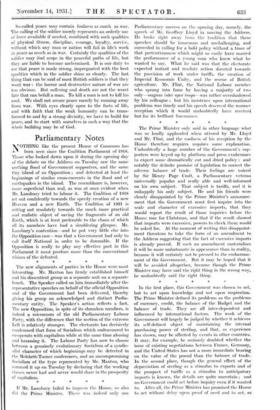Problems of the Christian Conscience
[We publish here the sixth article of a new Theological Series which we hope will throw light on some of the most disputed questions of conduct. Mr. Woolley is a Chaplain at Harrow School and Mr. Clayton is the Founder of " Toe H." Next week we hope that Canon Peter Green will write upon Gambling and Lotteries.]
VI.—Should a Christian Fight For His Country ?
BY THE REV. G. H. WOOLLEY, V.C., AND THE REV. P. B. CLAYTON.
AMAN is a man first, whatever his creed ; because of his creed, he becomes more essentially a member of the community of his fellow-men. As a Christian, he seeks to realize his ideal of a world community ; but the stability of a great community depends upon the loyalty of all and upon all first making their lesser communities sound. The home, the school, the town, the State demand the loyalty of their members, that they may be effective parts in a mankind made one in Spirit, as it is rapidly becoming one in organization and material interests. Now, a community involves some measure of self-identifi- cation of its members with the whole. As individuals, we cannot claim to be entirely free to follow our own ideas or desires. We shall only be free when we ourselves and our community are perfect, so that the wills of both become identical. Until then, we are bound to be faced by problems of how to harmonize our conduct with the policy of our State.
In the present state of world affairs the policy of any State might conceivably be the prosecution of a war. For many States are nervous of the aggrandisement of others and fear for their own existence. The instinct of self- preservation is just a fact of Nature. It may take the form of flight or of fighting. In the international world flight might nowadays take the form of appeal to the League of Nations. Were such an appeal to fail or to be despaired of, the alternatives are submission or fighting. Instinct is likely to urge fighting ; but then reflection points out that science and organization have made man's destruc- tive powers of fighting so terrific that even for the victor there may be nothing left worth having after another war.
The common sense of trying to prevent war is therefore obvious. Wars of misunderstanding are less likely now to occur owing to existing international machinery. So far as wars of aggression are concerned, aggressiveness is not likely to be the failing of the British-speaking peoples, at any rate. But the world is still able to provide the situation, on a small or a big scale, wherein we as a nation may be called upon to help in the preservation either of others or of ourselves. The destructiveness of war may be afoot without our choosing. Is the individual justified in condemning the State for accepting such a challenge ?
We speak of self-preservation. What exactly do we want to preserve ? In the first place the mere existence of life ; but, with the development of moral and spiritual values, man tends to seek to preserve the soul rather than the body. It might seem that we would in every case best accomplish our Christian end by handing over the body of the individual and of the State to the mercy of any attacker, and such should be the advice that we offer to others. But we have to beware of pursuing illusory abstractions. Religions, like States, cater for the whole man and for the whole community, body and soul. That the soul may express itself in living, the body must be protected by physical measures from famine and wolves. Who can say that physical measures are debarred when the danger is from man ; since man can prove himself more devilish than flood, famine, or wild beast ?
It is true that in History undue emphasis has been laid upon the glamour of war and the glory of heroes ; not enough emphasis has been laid upon peace-builders. But misplaced emphasis does not mean that we are to ignore or condemn the world's soldiers and sailors, or the qualities which have thrilled the world in legend, monu- ment and song. It has not been without its value for the human race that Achilles went to fight at Troy to avenge a wrong. Mistaken as the Crusades may have been, they flooded this country at any rate with sorely needed ideals of chivalry. The genius of Napoleon had constructive powers for his own country, and also demanded measures of self-preservation in the other countries of Europe. However complex were the causes of the Great War, it is a matter of thankfulness that the term a " scrap of paper " and the violation of Belgian neutrality could fire men's hearts to resentment. Such a word as " honour " may, of course, only involve a man's or a nation's personal complacency ; but it may also involve the foundations of social life. When men have seen their homes at stake, when men have seen vital principles of honour at stake, they have felt bound to resist ; and they have earned our gratitude.
To-day probably the vast majority of men and women who have been affected by European culture and Christianity are quite clear in their minds that there ought to be no more war. It is the duty of all to make war impossible. But the impossibility of war depends upon the manner of life of us all—our conduct, outlook, knowledge, votes—as well as our badly expressed ideals. Taking the world as a whole, its manner of life still demands that some force be employed in police work among individuals and among races. The weaknesses of men or of governments may cause war again. Certainly Governments are still determined to maintain armaments.
The individual is then liable to be faced with this choice : " Am I committed to fight for my country ? Or am I, as a member of a world-fellowship or as a child of God, forbidden to fight ? "
Circumstances must necessarily affect his decision ; they may be such that the majority would acclaim the conscientious objector as a saint and a hero. But it is possible for one equally hating war to feel himself called upon to fight ; for a man, who is prepared to obey the laws of his land in all ordinary circumstances, may naturally hesitate to refuse obedience when the matter in question is one of truth and freedom, or the preserva- tion of his country, whatever may be the odds against. Through the mistakes of man comes war ; but he would rather serve in a cause believed to be true, though it may be mistaken, than make the mistake of not serving.
Christianity indeed tells us to form ideals for our life, and to stand fearless upon our own feet living up to them ; to transform the world until it be one where the Spirit of God is active—glorious in all men. Christianity also points out that we have to live in this world as it is, in order to transform it to something better. So we have to serve Caesar as well as God ; but we are not to be content until we have so improved ourselves (including Caesar) that the wills of God and man become identical.
At present the individual may not sacrifice the community to his own ideas, any more than the community should rule individuals like machines. After all, mankind is still in the fashioning. Force helps to make man, as well as to mar him. For power is not evil; only man's abuse of power is evil. It is true that force may end a man's life, but the object of life is not merely - to go on living, but through living to express a goodness that is Divine, So-called peace may contain foulness as much as war. The calling of the soldier merely represents an orderly use of force available if needed, combined with such qualities of physical fitness, discipline, courage, loyalty, service, without which any man or nation will fail in life's work in peace as much as in war. Certainly the qualities of the soldier may find scope in the peaceful paths of life, but they are liable to become undermined. It is our duty to see. that peace is made strong, impregnated with the best qualities which in the soldier shine so clearly. The last thing that can be said of most British soldiers is that they want ware the horror and destructive nature of war are too obvious. But suffering and death are not the worst fate that can befall a man. To kill a man is not to kill his soul. We shall not secure peace merely by running away from war. With eyes clearly open to the facts of life, and with faith that the weak humanity can be . trans- formed to and by a strong divinity, we have to build for peace, and to 'start with ourselves in such a way that the whole building may be of God.



































 Previous page
Previous page